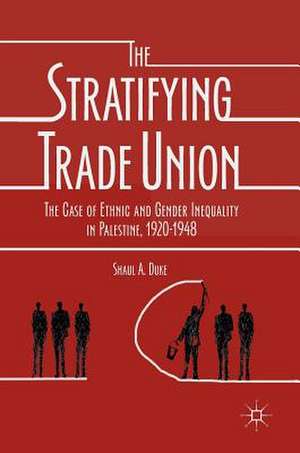The Stratifying Trade Union: The Case of Ethnic and Gender Inequality in Palestine, 1920-1948
Autor Shaul A. Dukeen Limba Engleză Hardback – 26 oct 2017
| Toate formatele și edițiile | Preț | Express |
|---|---|---|
| Paperback (1) | 204.34 lei 6-8 săpt. | |
| Springer International Publishing – 24 aug 2018 | 204.34 lei 6-8 săpt. | |
| Hardback (1) | 395.25 lei 6-8 săpt. | |
| Springer International Publishing – 26 oct 2017 | 395.25 lei 6-8 săpt. |
Preț: 395.25 lei
Nou
Puncte Express: 593
Preț estimativ în valută:
75.64€ • 77.46$ • 62.92£
75.64€ • 77.46$ • 62.92£
Carte tipărită la comandă
Livrare economică 18 martie-01 aprilie
Preluare comenzi: 021 569.72.76
Specificații
ISBN-13: 9783319650999
ISBN-10: 3319650998
Pagini: 312
Ilustrații: XVII, 312 p. 6 illus., 3 illus. in color.
Dimensiuni: 148 x 210 mm
Greutate: 0.59 kg
Ediția:1st ed. 2018
Editura: Springer International Publishing
Colecția Palgrave Macmillan
Locul publicării:Cham, Switzerland
ISBN-10: 3319650998
Pagini: 312
Ilustrații: XVII, 312 p. 6 illus., 3 illus. in color.
Dimensiuni: 148 x 210 mm
Greutate: 0.59 kg
Ediția:1st ed. 2018
Editura: Springer International Publishing
Colecția Palgrave Macmillan
Locul publicării:Cham, Switzerland
Cuprins
1. Introduction
2. Mandatory Palestine's Political Economy and Trade Union Regime
3. Full Union Exclusion: The Case of Mandatory Palestine's Arabs Severe Partial Union Exclusion: The Case of Yemeni Jews in Mandatory Palestine
5. Moderate Partial Union Exclusion: The Case of Ashkenazi Women Workers in Mandatory Palestine
6. Standardization, Inclusion, and Tying Together the Union Uses Model
7. Conclusion
Notă biografică
Shaul A. Duke recently earned his PhD from the Department of Sociology at Ben-Gurion University, Israel. His work on political sociology's tendency to ignore the masses' role in endorsing repressive policies was published in Critical Sociology, and his work on technology's potential to enable independent large-scope research appeared in Current Sociology.
Textul de pe ultima copertă
This book examines a basic assumption behind most of the critical, progressive thinking of our times: that trade unions are necessarily tools for solidarity and are integral to a more equal and just society. Shaul A. Duke assesses the trade union's potential to promote equality in ethnically and racially diverse societies by offering an in-depth look into how unions operate; how power flows between union levels; where inequality originates; and the role of union members in union dynamics. By analyzing the trade union's effects on working-class inequality in Palestine during 1920-1948, this book shifts the conventional emphasis on worker-employer relations to that of worker-worker relations. It offers a conceptualization of how strong union members directed union policy from below in order to eliminate competition, often by excluding marginalized groups. The comparison of the union experiences of Palestinian-Arabs, Jewish-Yemeni immigrants, and Jewish women offers a fresh look into the labor history of Palestine and its social stratification.
Caracteristici
Offers a novel model for understanding when trade unions include, and when they exclude
Presents an investigation of trade unions in Palestine, a hitherto understudied context
Uses case studies and thorough research to present a unique and significant contribution to the study of racism/ethnicity in trade unions - a new but growing area of scholarly investigation
Presents an investigation of trade unions in Palestine, a hitherto understudied context
Uses case studies and thorough research to present a unique and significant contribution to the study of racism/ethnicity in trade unions - a new but growing area of scholarly investigation
